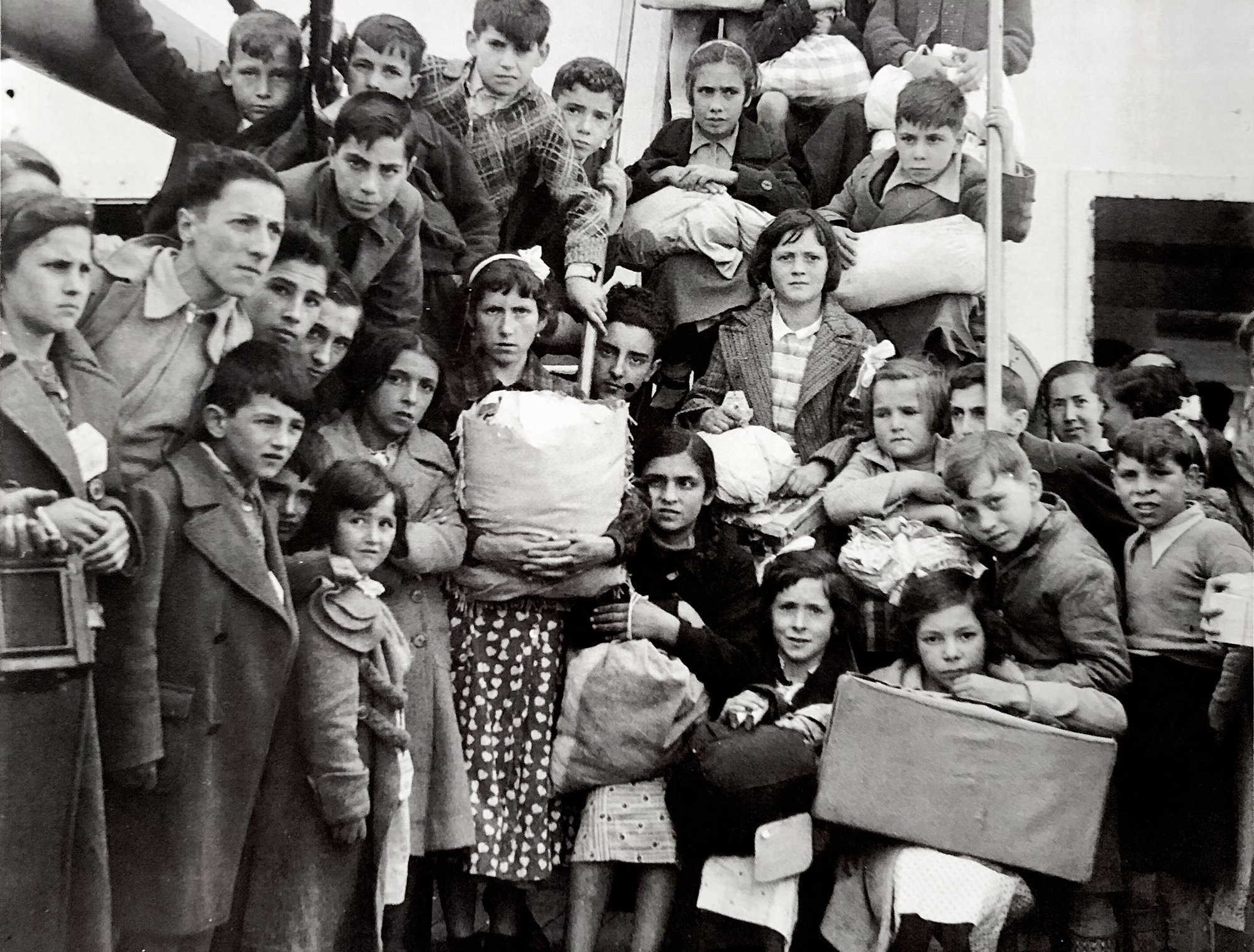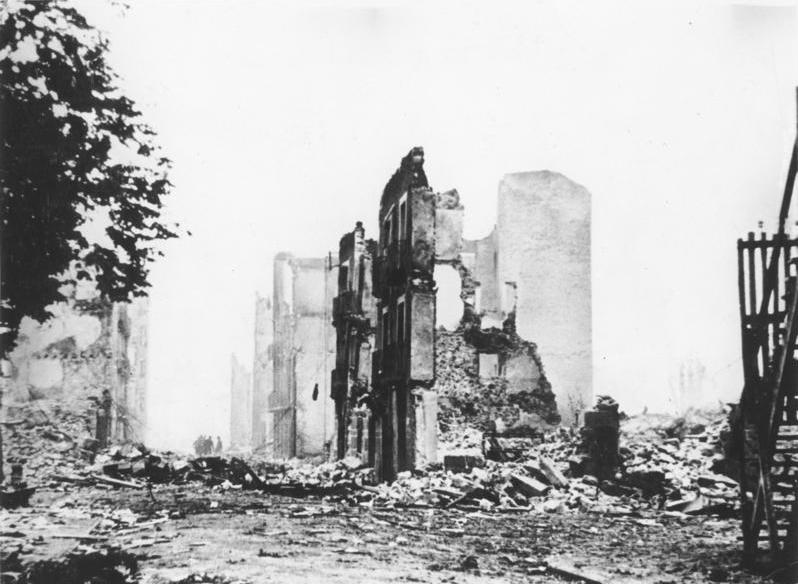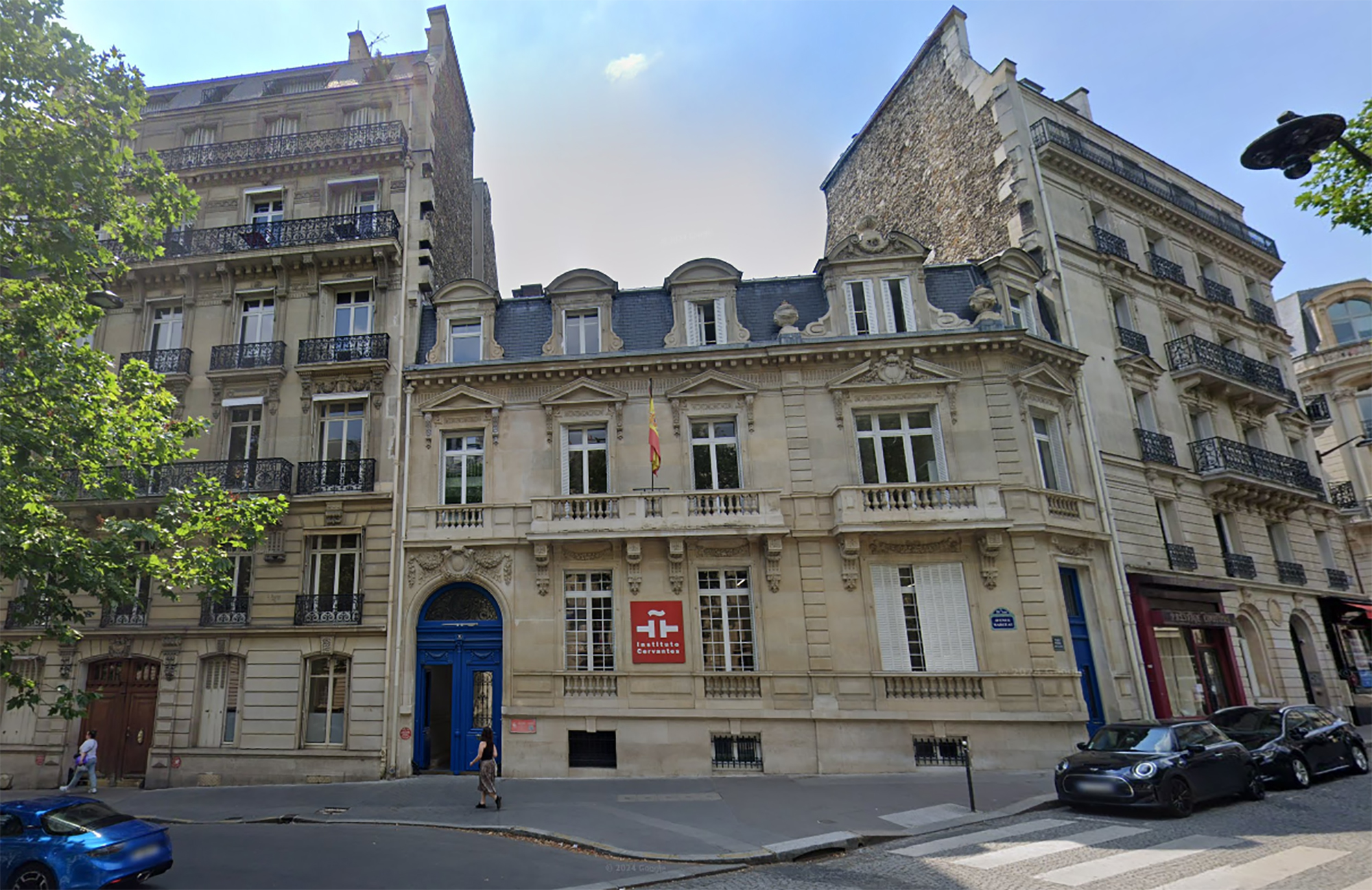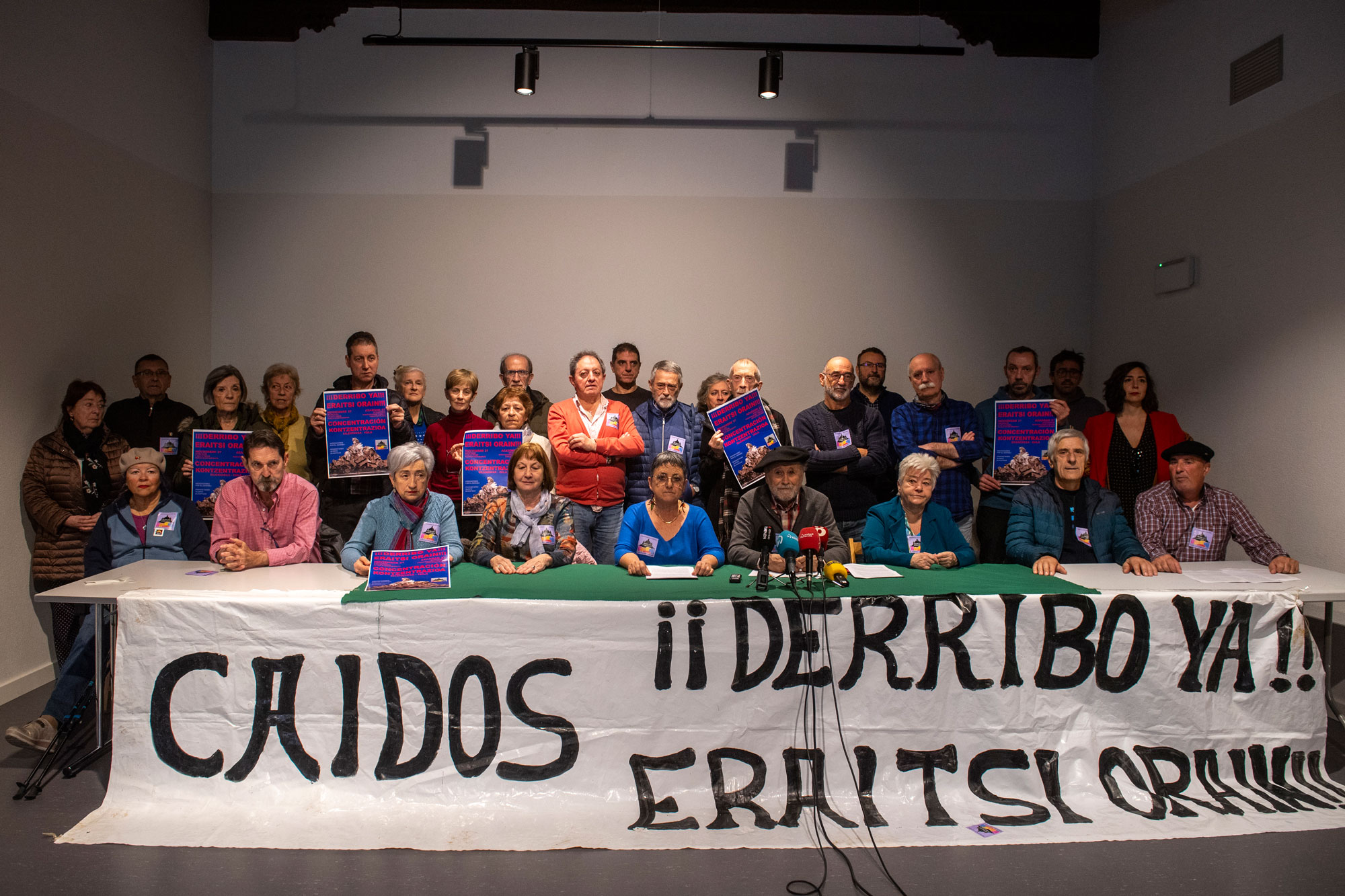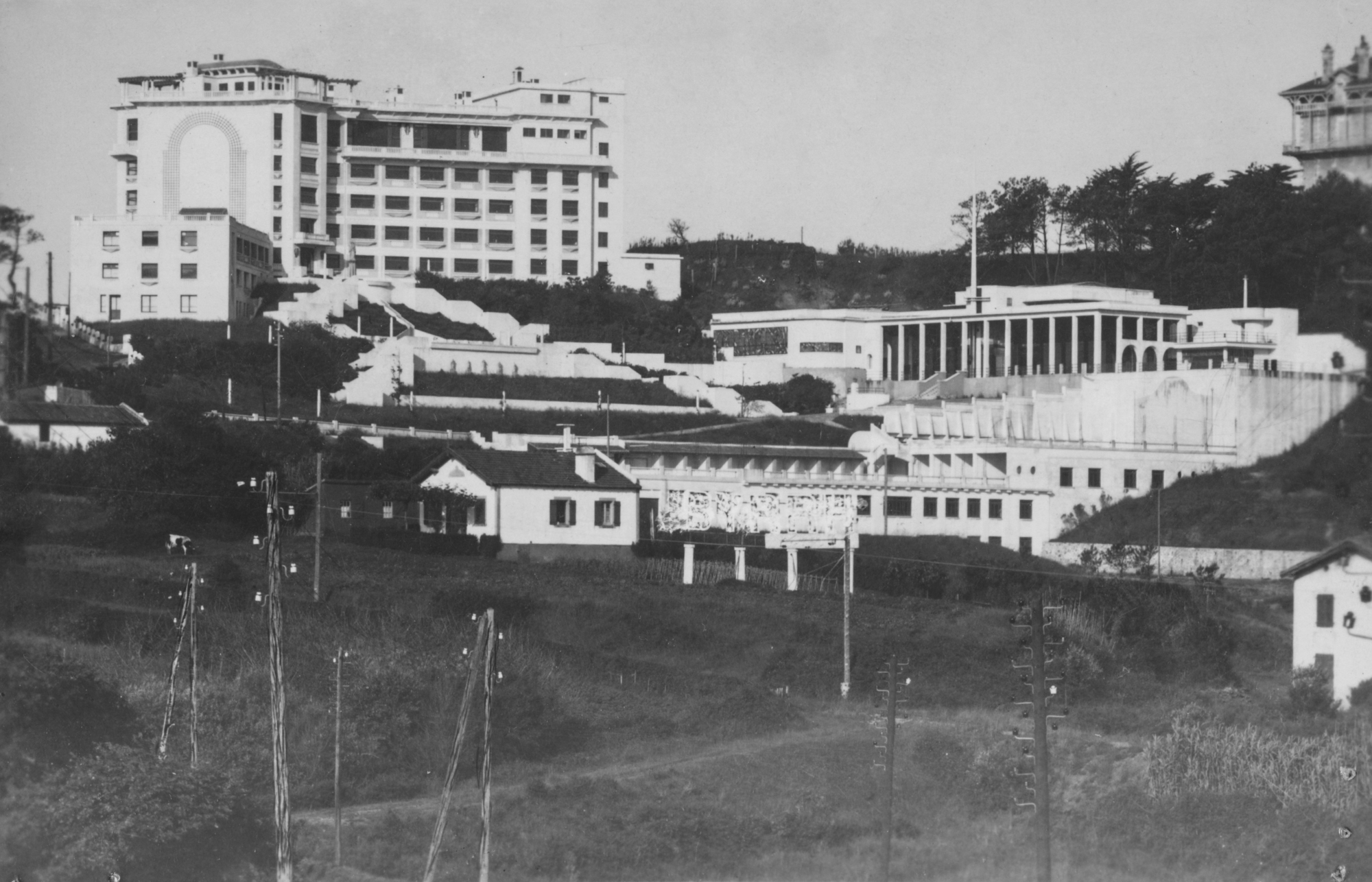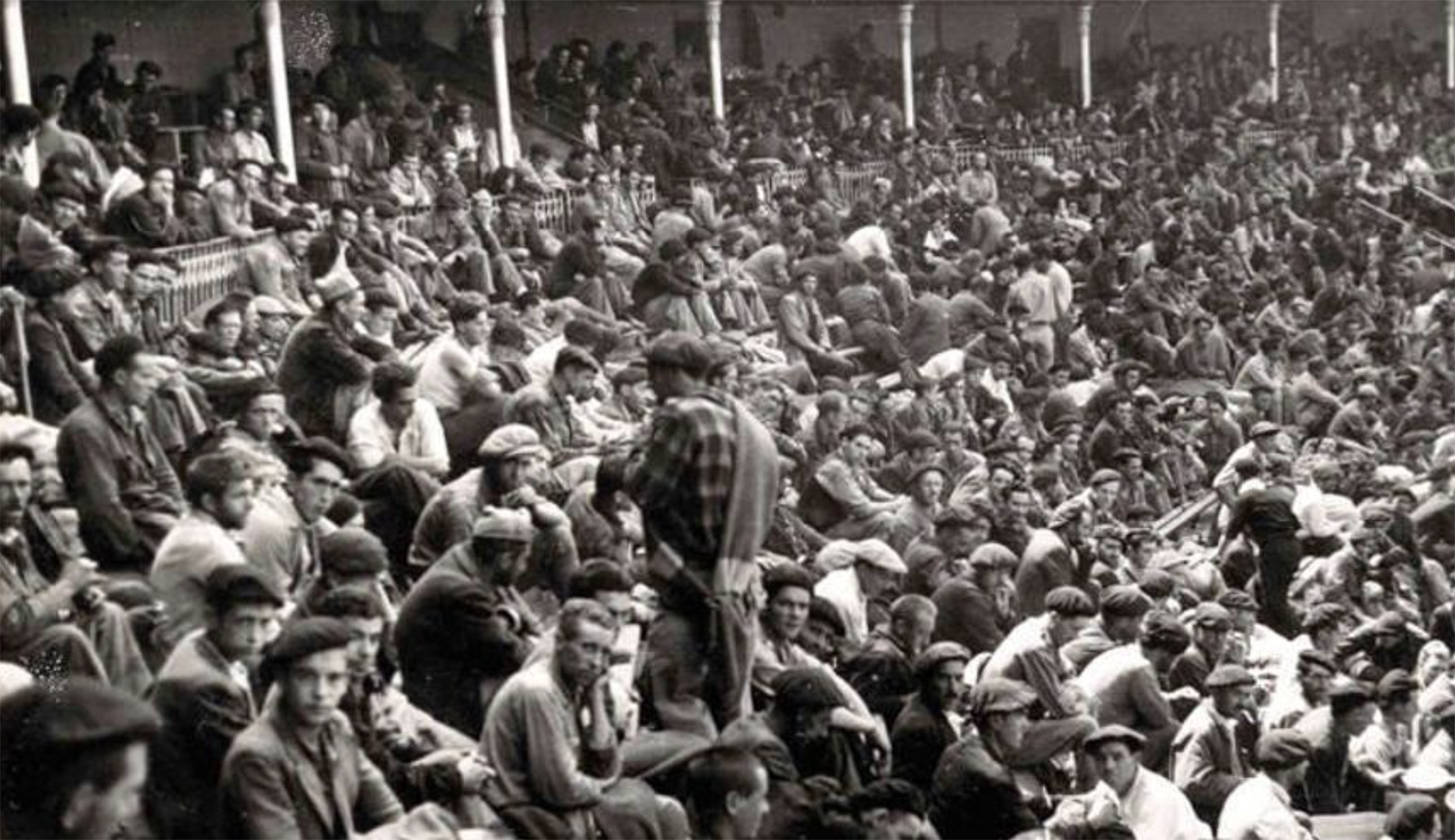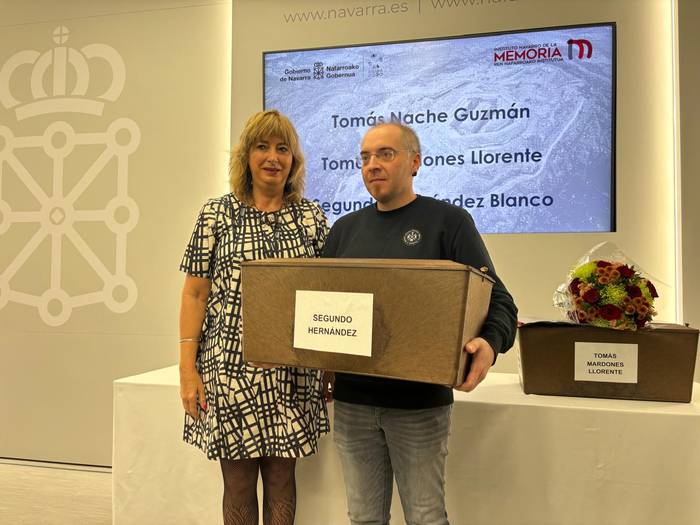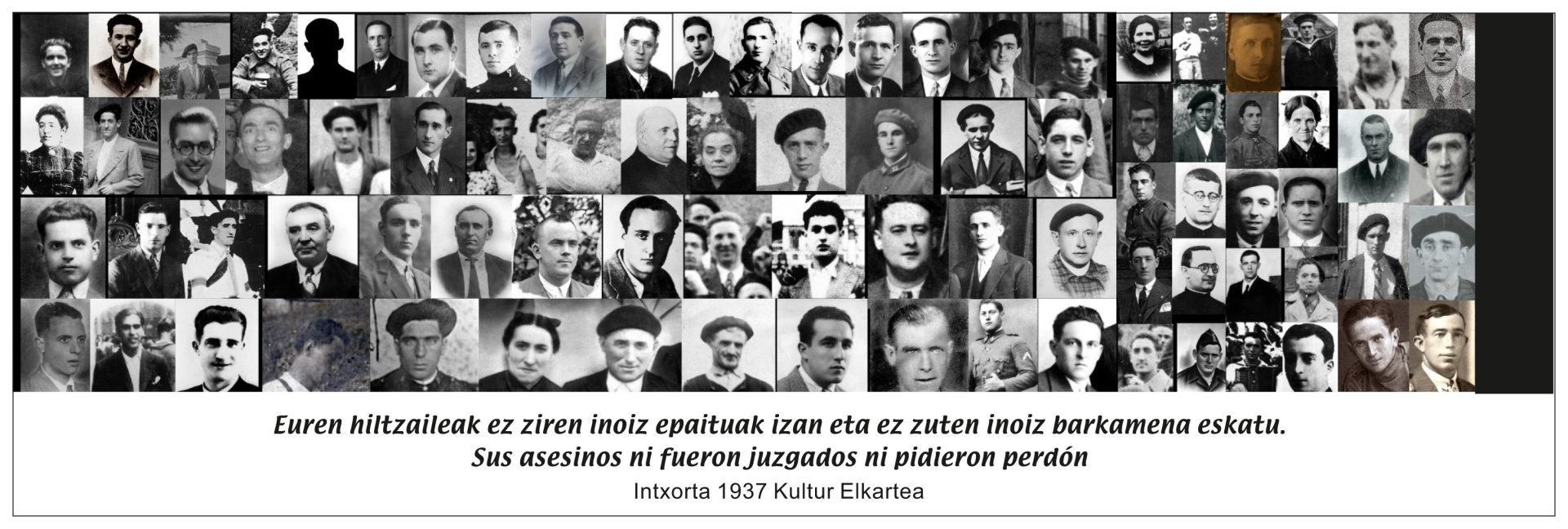"The bar speaks fluently, too easily"
- Natural from Zarautz, she's 97 years old. Before the Spanish Civil War, lehendakari Agirre will offer a rally in the Basque town of Bermeo. Then war. Fire pumps and noise from mortars and machine guns. Exile. Donibane Garazi Fort War Children's Stay Come back. Transport of propaganda from San Juan de Luz to Bilbao. Public transport from Bera to Larrun. Painting from Durango to Galdakao. Ferocious nationalist Elezkano.

Herriko Ariz auzoan ezagutu zituen gerra eta erbesteratzea. Gerrako haur nagusietakoa izan zen, eta, gero, erresistentziako kide. Gazterik ekin zion hormak margotzeari, eta laster ehizatu zuten EAJren erresistentzia ekintzen buru Mikel Isasi eta Joseba Rezolak. 1964an, inoizko margotzerik handiena egin zuen, hiru kiderekin batera, Durangon hasi eta Galdakaoraino. Harrapatu zituzten, baina ez zuten haien sua apaldu. Abertzale gogor jardun du beti Elezkanok.
“Before, it’s us/the very temperate abertzales,” says Joxe Austin Arrieta’s copla… I’m one
of the first! Kar, kar… And one of the hardest openings I, our father, Matthew Elezkano Bilbao. He was president of Euzko Langileen Alkartasuna in Basauri. He was a baker by profession in the Ariz neighborhood. The mother was born in Bengoetxe, in Galdakao. His name was Dionisia Ibarretxe Etxebarria. Our parents talked to each other in Basque, and we also learned. On the one hand and on the other, I lost Euskera on the road, but my sisters didn't, after they grew up in Euskera. As a child, my father took me to a rally by José Antonio Agirre in Bermeo, and I remember there giving Agirre some untold applause.
I was 13 years old when the war entered.
It was chaos! People's hunger! We, however, had a lot of orchard and we had lots of cabbage, lettuce, tomato, pepper and pods. We also had chickens and therefore eggs. If it was needed, her mother would take a hen and take it away! And when it wasn't a hen, a rabbit! On the other hand, since my father was a baker, there was never a shortage of loaves and flours. Anyway, sometimes it was missing, because the neighbors came to ask their mother for bread, and because Dionysia was a disgraceful beast, she handed it all over. More than once we were forced to leave our house without bread. So anyway, Mom took the flour and made the cake so that we starved to death.
1936, Spanish War in Basauri.
I remember that a refuge was made under the bridge of Ariz, but neither did my father nor I enter into it: we always work in the garden. Sometimes they had thrown fire bombs, bombs that fell in the nearby fields, but we in our garden! One day, while my father and I were at Ariz's bakery, a captain of gudaris appeared who was about to break the bridge of Ariz and the nationals arrived at Urbi. And Urbi and then there was Ariz. We had to get away from there, the soldiers' captains. Then a certain Ojenbarrena, who worked in the bakery, shouted: “But I have Urbin all my family!” And the captain said, “Well, now is the time. Whoever wants to get out of here, let him come out right now.” We were all scared, the noise of the planes and of the crutches was impressive, it would be six in the afternoon, we had lost ourselves to the sun. It had been proposed to meet with the family. We went out with him, the parents and the five brothers! It was a chaparron of gunshots and mortars! And the noise of the planes over the earth!
Where did they flee?
As far as possible, the nationals were not in the party. First, to Arrigorriaga, from there to Bilbao, then to the stop of the suspension bridge of Portugalete… We spent two nights on the bridge of Portugalete, without leaving, eating what we could. Until my father said, "This is not a disaster! Get out of here and go to Santander. I will follow you as soon as possible.” We got started and a truck stopped on the road. They were Eibar socialists, encamped by Ariz's bakery, and they met us. They took us to Laredo, in a convent. It was full of Basques! We stayed there for fifteen or twenty days without any news from my father.
Until they evacuated you.
The representatives of the Basque Government came and told us that they would evacuate us. But we were six, the mother and five siblings, and they told us they couldn't take us all together. So, on the one hand, three brothers and, on the other, the mother with our two sisters. They took us to the port of Santander, put Molton in the English coal company and took us to Bordeaux! We went into exile! There were families, women and children. The Spanish warship Cervera arrested us on the high seas. What a panic! Some of Cervera came to our boat, inspected the boat and let us go free. I remember when we went down in Bordeaux they gave us cheese, chocolate… eating. What a hunger! From there they took us to the fort of San Juan de Pie de Puerto.
You were war children ...
Yes. We arrived at Garazi at night. The Government had everything ready. They undressed us, washed us and gave us other suits. And we were separated by age. I was placed with the elders. There I had Pelayo Bernedo as a professor or manager. He was from Ondarroa, more nationalist than Sabino [Arana Goiri]. My brother, there, looked at Karmen Zunzunegi. Under the direction of Bizente Amezaga. His brother Modesto was also there as a professor. And Diego Eraso, Navarro, very good professor. And also the cure Fortunato Goizueta, former pastor of Begoña. They took great care of us. The housewives and cooks of Lekeitio and Bermeo were excellent. We ate well and we all get fat! Ajajajajajajajajajajajajajajajajajajajajajajajajajajajajajajajajajajajajajajajajajajajajajajajajajajajajajajajajajajajajajajajajajajajajajajajajajajajajajajajajajajajajajajajajajajajajajajajajajajajajajajajajajajajajajajajajajajajajajajajajajajajajajajajajajajajajajajajajajajajajajajajajajajajajajajajajajajajajajajajajajajajajajajajajajajajajajajajajajajajajajajajajajajajajajajajajajajajajajajajajajajajajajajajajajajajajajajajajajajajajajajajajajajajajajajajajajajajajajajajajajajajajajajajajajajajajajajajajajajajajajajajajajajajajajajajajajajajajajajajajajajajajajajajajajajajajajajajajajajaj
How long did you stay in Donibane Garazi Fortress?
I wasn't there for two years. My siblings, two and peak. My mother spent about eight months in Dax with our sisters. We also learned that my father, after arriving at Karrantza, returned to Basauri, where he was captured and imprisoned for belonging to the Basque Workers. He was accused of “political responsibilities”. It didn't take long to arrive, because some neighbors gave faith to our father, like Cesareo Urgoiti, the parish priest of the town. However, the defendant was sentenced to a fine of 10,000 pesetas for an injury offence. It was a baker in Ariz, they did not want to take it in the bakery before, but in another in Galdakao, in the bakery of Rikardo Goiarrola, and then in the bakery of Fernández and Goikuria in the street Pozokoetxe de Basauri, in La Basconia.
.jpg)
In 1939, at the end of the war, Franco's government tried to return the children from the war.
They forced our father to reclaim us, and our mother and sisters returned to Basauri. We, three brothers in Garazi, no, decided that we would not return. However, they chose me to do more studies with other colleagues and sent me to Ziburu, at the inn of Anchochuri. They had turned him into a college and we were there until we went back to Basauri. I was 15 years old, I had no intention of learning more, and I got to work at Fireston, until I got to military service. When I came back, we went to meet with my old friends and entered the salsa.
In which sauce? What do you mean? That before the war we had been from
the Euzko Gaztetxu, that we knew people who were very nice Abertzales, that we started going to the mountain and so, without anyone's order, we set out to paint the walls. In one of them, we would place Gora Euzkadi Azkatuta. In the other JEL. Eleven! And I tell you, without anyone ordering you, with our desire, our illusion and our anger. We became friends with the party people. For example, we became friends with Andoni Sopelana. Andoni was president of the Artagan mountain club of Basauri, and a hard abertzale! He saw us, he preferred some and took us on an excursion to Ezpeleta. There, a certain Bilbao, or an alias, told us about the homeland, that we had to fight for the Basque Country.
He was therefore one of the chosen ones.
Yeah, I guess. Luis Mari Álvarez, Juan Astigarraga, Jose Luis Perez Iriarte… There are some. But when we came back, Andoni said to me: “There is no party that feels as much as you do. I’ll introduce you to another friend who will order you to do something in secret.” It was Luki Artetxe, one of the burukides of the PNV. “At the moment, not a single movement. We’ll let you know when the time comes,” Luki said. Said and done. A month later, he sent me to go to Ziburu to meet Miguel Isasi. Another comrade! Mikel [Isasi] took me to San Juan de Luz, to Joseba Rezola's house. Vice-President of the party! “Your mission is absolutely confidential, secret. No one should know, not your family.” What will be my job and bring the ‘papers’ to Bilbao.
Propaganda.
Documents, I guess. Documents reserved. But I didn't know. I picked up what had to be picked up, brought it to Bilbao and picked it up by another, coming to my workshop. In the morning he was leaving earlier from Bilbao to San Juan [Lohizune], and returning to Bilbao before noon. They would give me some folders, hang them on my back, and come. I had never thought about hiding that material in the car. I could perfectly spy on myself in the car and take that secret material. I started to bring the folders in, and then I passed people on the other side.
Did you also dedicate yourself to moving people to Ipar Euskal Herria?
Yes, yes! I was from the Artagan mountain club of Bilbao, I knew that mountain as well as the portal of my house! He went to Bera and from there he accompanied the people from one side to the other. He walks a lot of people. Nobody in the house should know anything, and they didn't know, but they had a big suspicion! I once told them: “We have to make a small trip on Sunday to San Juan de Luz.” And there we went: “Well, I’m going to greet a friend, but I’m coming back with you very soon.” I had to pick up the material, walk a little longer with the family and go home. However, I was very careful. No one needed to know.
Although you walked very carefully, at some point you were surprised.
Yes. One day, Mikel Isasi: “We have a mission for you. We’ve been analyzed by Joseba Rezola and I, and we don’t know if you’re going to be able to do it.” They wanted to carry out great propaganda action, from Durango to Galdakao. We were already painted, but what they wanted to do was a lot of work. We were four, José Antonio Isasi, Juan Astigarraga, Sagardui and I. Ask them, and yes, we would. We were informed that the police were conducting the surveillance round two to three in the morning, and we decided we would do it before it happened. However, Isasi and Rezola promised me I would paint the day: 20 September [1964].
.jpg)
How did they do this? From Durango to Galdakao there are many walls.
You cannot know better than me! Ha ha ha! At midnight, the date was in Iurreta. As soon as we get together, we start painting here and there. What a bleach! I didn't paint anything, I always put myself in the car: friends came down, painted, entered the car again, and in the air! My little brother had a workshop in Amorebieta, a newly painted facade. We also painlessly paint it, but in our own way. Ha ha ha! My brother didn't know he was in the mess. Great success! It was also published in the journal Gudari. But ten days later he came to find me the civil guard. And to La Salve's barracks. First of all, I knew nothing. Then, when I learned that Juan Astigarraga was detained, I confessed to them the truth, that I was responsible, and that I would leave my peers at peace. Useless, of course. Mean bad, they didn't capture [José Antonio] Isasi.
How did you know you were?
A nonsense, a great nonsense! People were talking only about painting in Basauri and everything. To begin with, in the bars of Basauri the theme of the talk was the same: that great drawing we made. And apparently, one of our friends spake more than he should at the Bizkargi bar, one of the favorite bars in our crew. Hence the error. In the bar, you talk very easily and you put us in the pit. I was locked up in Larrinaga prison! What a pig! Then, in Basauri's, but not for a long time, as the lawyer did a great job. However, back and forth, they didn't close my case until 1969. In the meantime, the police turned me around...
* * * * * * * * * * *
“In 1965, the three
detainees took us to the Public Order Tribunal for painting. My lawyer, Jaime Miralles, talked about our struggle, anti-Franco, our historical rights. He asked for my acquittal, claiming that that act was a nanny, saying that that judgment was a farce… I, amazed, told the Audience about a black ass and two, and the other in silence! Finally, I was sentenced to one year in prison and a fine of fifteen thousand pesetas. Friends, free.”
I.V.A.S. “The 1967
Aberri Eguna took place in Pamplona. Before Sunday, on Friday morning we left Bilbao and went to Hernia. Climb to the top of a good mood, the “Gora Euskadi!” and more, put the mountain card in the mailbox and descend. And there we get civil guards and they scream at us. "Oh my God! ". We come from the top of Hernio. The question and the question kept us there, while two of them went up to the top, looked at the mailbox and picked up our cards. We on the G.E.A. card. We had the habit of putting, Gora Euskadi Askatuta,” but when we were asked by the civil guards, we told them that it meant “Alpine Speleologist Group”. And believe them!”
In 1969,
the fight on the street was overflowing with explosives, Molotov cocktails... Police captured many ETA youth without a beard. Fraga declared a state of emergency in the Basque Country. I, for my part, go to jail and serve the penalty of painting. I entered Basauri and was welcomed by Txomin Ziluaga. It was not long before the head of ETA presented it to me: Edu Uriarte, Mario Onaindia, Xabier Larena, Andoni Arrizabalaga… They were of great discipline: gymnastics, Basque classes, studies, political debates…”.
1936ko Gerran milaka haurrek Euskal Herria utzi behar izan zuten faxisten bonbetatik ihes egiteko. Frantzia, Katalunia, Belgika, Erresuma Batua, Sobietar Batasuna eta Amerikako herrialdeetara joandako horien historia jasotzeko zeregin erraldoiari ekin dio Intxorta 1937... [+]
Ezpatak, labanak, kaskoak, fusilak, pistolak, kanoiak, munizioak, lehergailuak, uniformeak, armadurak, ezkutuak, babesak, zaldunak, hegazkinak eta tankeak. Han eta hemen, bada jende klase bat historia militarrarekin liluratuta dagoena. Gehien-gehienak, historia-zaleak izaten... [+]
Pamplona, 1939. At the beginning of the year, the bullring in the city was used as a concentration camp by the Francoists. It was officially capable of 3,000 prisoners of war, at a time when there was no front in Navarre, so those locked up there should be regarded as prisoners... [+]
Segundo Hernandez preso anarkistaren senide Lander Garciak hunkituta hitz egin du, Ezkabatik ihes egindako gasteiztarraren gorpuzkinak jasotzerako orduan. Nafarroako Gobernuak egindako urratsa eskertuta, hamarkada luzetan pairatutako isiltasuna salatu du ekitaldian.











